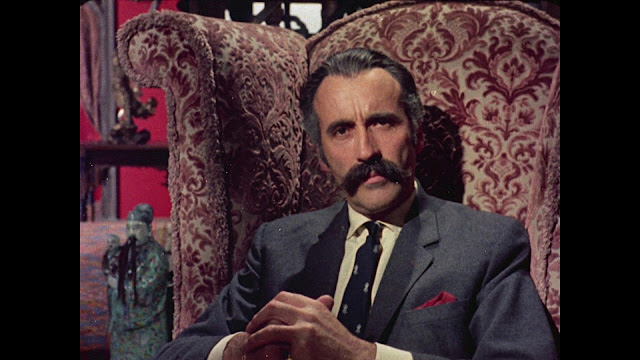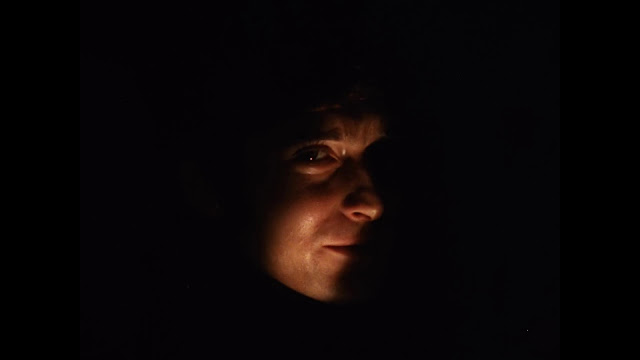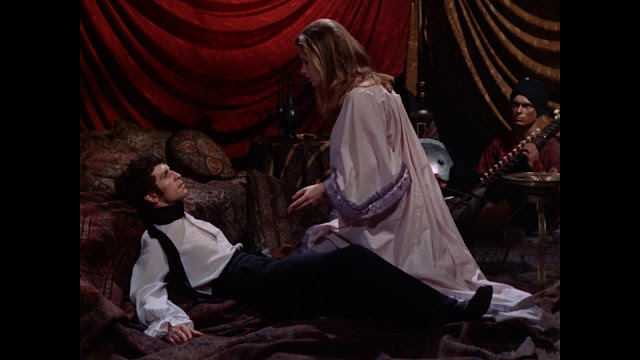 |
| Your host - the only man who could say "I'm Christopher Lee" and convince you of it. |
The same qualities of craft, personality, fatalism, irony, metaphysics, humor and taste that I've consistently found in the works of all the filmmakers named above is something I also derived in small but sweet doses from almost every episode of THEATRE MACABRE, the 24-episode series of short Polish films hosted by Christopher Lee for broadcast in 1971-72, which compose the last discs in Severin Films' box set THE EUROCRYPT OF CHRISTOPHER LEE. It must be noted that the films making up this series were never intended to be shown as such; in Poland, they were originally televised on Telewizja Polska between 1967-69 as individual shorts, when they could only be shown in black-and-white - and it is only in this recorded form that they have ever been repeated. The films were originally produced by Film Polski - Iluzjon Film Unit and subsequently collected and repackaged for English export by Murray B. Silverman and Trans World Television Productions, Ltd. Unfortunately, the films all originally ran in the neighborhood of 27 minutes, which left little room for export modification, so the credits for these productions are here grievously incomplete; no cinematographers or editors of the original material are mentioned, only the creators of the Lee wrap-arounds and the composer of THEATRE MACABRE's lurching main theme, Ron Goodwin.
 |
| Lovely period composition in "First Love." |
What most viewers are likely to notice about the stories off the bat is that, for the most part, they are not all that "macabre" - not the majority of them, anyway. This is not the fault of the original productions, which were never intended to be such a thing. The title imposed on the series by Trans World was surely suggested by Lee's presiding, but THEATRE MACABRE inspires expectations that most of these stories never set out to fulfill - indeed, the very first episode ("First Love," scripted by one of my Polish masters, Andrzej Wajda) is so singularly unsuited to the given theme that some viewers may be angered by it, as they are left wondering how the hell it qualifies. However, several others do accommodate the strange, the bizarre, the exotic, the unusual - and there are several real gems, including two stories adapted and directed by another of my masters, Andrzej Zuławski, at the outset of his career. I opened this review as I did to help others understand why the overall scope of these stories may have found in me a more receptive viewer than most. From the very beginning, I found myself consistently charmed and intrigued by the actors (the pretty actresses and the wonderful character players), impressed by the humble but sincere craftsmanship enriching all levels of an understated production, and pleased by all their varied approaches to storytelling. Without exception, I found myself happy to watch three episodes at a time.
 |
| The Greek peasant parents of a child who is about to learn an unpleasant life lesson in the absorbing story "Mateo Falcone." |
Severin Films doesn't provide an enclosure to help us identify the stories, to tell us which stories they are or who wrote them, or indeed who wrote and directed them, and at present, the IMDb isn't much more helpful. So I took the trouble of going through every episode and jotting down the pertinent information. Alas, the cast acknowledgements are usually limited to only two names and we are not told who these actors played.
Disc 1:
1. First Love. 10-01-71. Directed by Sylvester Checinski. Based on Ivan Turgenev's "First Love" by Andrzej Wajda. With: Magdalena Zawadzka, Wojciech Szymanski.
2. The Man Who Demoralized Hadleyburg. 10-08-71. Directed by Jerzy Zarzycki. Adapted from Mark Twain's "The Man Who Corrupted Hadleyburg" by Zdzislaw Skrowronski. With: Leon Niemczyk, Bronislaw Pawlik.
3. The Tortures of Hope. 10-15-71. Directed and scripted by Ewa and Czeslaw Petelsky from the story by F.A. Villiers de L'Isle-Adam. With: Henryk Boukolowski, Wladyslaw Hancza.
4. Mateo Falcone. 10-22-71. Directed by Jan Budkiewicz. Adapted by Jan Budkiewicz and Jerzy Szeski from the story by Prosper Merimée. With: Bogomil Simeonov, Iwailo Simeonov.
 |
| "The Vampire" is one of the rare straight horror episodes, from the author of BLACK SABBATH's "The Wurdalak." |
5. The Vampire. 10-29-71. Directed by Stanislaw Lenartowicz. Dapted from A.K. Tolstoy's story by Ziemowit Fedecki. With: Jadwiga Chojnacka, Aleksandra Zawieruszanka, Jan Machulski.
6. The Swashbuckler. 11-05-71. Directed by Stanislaw Lenartowicz. Adapted from the story by Ivan Turgenev. With: Aleksandra Zawieruszanka, Tadeusz Lomnicki.
7. The Actress. 11-12-71. Directed and adapted by Stanislaw Lenartowicz from the story by A.K. Tolstoy. With: Anna Ciepielwska, Gustaw Lutkiewicz, Zdzislaw Maklakiewicz, Zdzislaw Kuzniar.
8. The System of Doctor Tarr and Professor Feather. 11-19-71. Directed and adapted by Janusz Majewski from the story by Edgar Allan Poe. With: Jerzy Przybylski, Krzysztof Kalczynski.
9. The Rajah's Diamond. 11-26-71. Directed by Sylwester Chechinski. Adapted by Andrzej Jarecki from the stiory by Robert Louis Stevenson. With: Wladyslaw Hancza, Jerzy Karaszkiewicz.
10. The Nose. 12-03-71. Directed and adapted by Stanislaw Lenartowicz, from the story by Nikolai Gogol. With: Elzbieta Goralczyk, Zdzislaw Maklakiewicz.
 |
| Olgierd Lukaszewicz stars in one of the set's most impressive episodes, a magnificent retelling of Poe's "The Tell-Tale Heart." |
11. Tell Tale Hearts. 12-10-71. Directed by Jan Laskowski. Adapted by Jan Laskowski and Jan Borkowski from "The Tell Tale Heart" by Edgar Allan Poe. With: Olgierd Lukaszewicz, Wladyslaw Jarema.
12. Markheim. 12-17-71. Directed and adapted by Janusz Majewski from the story by Robert Louis Stevenson. With: Aleksandr Bardini, Jerzy Kamas.
 |
| Czeleslaw Wollejko as Oscar Wilde's "Canterville Ghost." |
Disc 2:
13. The Barrel Organ. 12-24-71. Directed by Stanislaw Jedryka. Adapted by Zdzislaw Showronski from the story by Bolesaw Prus. With: Tadeusz Fijewski, Iza Nowocin.
14. The Canterville Ghost. 12-31-71. Directed by Ewa and Czeslaw Petelsky. Adapted by Zdzislaw Skrowronski from the story by Oscar Wilde. With: Czeslaw Wollejko, Witold Debicki.
15. Decameron. 01-07-72. Directed by Jan Budkiewicz. Adapted by Jan Budkiewicz and Andrzej Czalbowski from "The Decameron No. 40" by Giovanni Boccaccio. With: Marzena Trybala, Peter Slabakov.
16. A Matter of Conscience. 01-14-72. Directed and adapted by Ewa and Czeslaw Petelsky, from the story by Ambrose Bierce. With: Andrzej Lapicki, Wieslaw Golas.
17. The Husband Under the Bed. 01-21-72. Directed by Stanislaw Rozewicz. Adapted by Stanislaw Rozewicz and Tadeusz Rosewicz, from the story by Fyodor Dostoevski. Bronislaw Pawlik, Roman Wilhelmi.
 |
| Piotr Wysocki and Beata Tyszkiewicz in Andrzej Zulawski's "The Song of Triumphant Love." |
19. The Song of Triumphant Love. 02-04-72. Directed by Andrzej Zuławski. Adapted by Miroslaw and Andrzej Zuławski, from the story by Ivan Turgenev. With: Beata Tyszkiewicz, Piotr Wysocki.
20. The Postmaster. 02-11-72. Directed by Stanislaw Lenartowicz. Adapted by Jerzy Stawinski, from the story by Alexander Pushkin. Andrzej Lapicki, Teresa Tuszynska.
21. A Terribly Strange Bed. 02-18-72. Directed and adapted by Witold Lesiewicz from the story by Wilkie Collins. With: Maria Ciesielska, Wieslaw Golas.
22. The Fatalist. 02-25-72. Directed by Stanislaw Lenartowicz. Adapted by Ziemowit Fedecki, from the story by Mikhail Lermontov. With: Gustaw Holuobek, Andrzej Hrydzewicz.
23. Resurrection of the Offland. 03-03-72. Directed by Jerzy Zarzycki. Adapted by Zdzislaw Skowronski, from the story by Alexandre Dumas. With: Wanda Koczeska, Andrzej Antkowiak.
24. The Boarded Window. 03-10-72. Directed and adapted by Janusz Majewski, from the story by Ambrose Bierce. Ewa Krzyzewska, Jsef Duriasz.
 |
| Jerzy Jogałła as the Malayan servant in "The Song of Triumphant Love." |
If I remember correctly, all but two of the episodes are period pieces, which lends itself quite well to a storytelling anthology. One of the rare modern episodes is Janusz Majewski's unorthodox adaptation of Poe's "The System of Dr. Tarr and Prof. Feather," which is more creative than satisfying; another is Ewa and Czeslaw Petelsky's go at Wilde's "The Canterville Ghost," which isn't as witty as the original story but makes inventive use of color in the same manner as David Lean's film of Noël Coward's BLITHE SPIRIT (1945).
Unsurprisingly, the very best episodes collected here are the two by Zuławski, which he scripted with his father. Both tales involve music and love as their themes, but only the second is fantastic (even "macabre") in nature. "Pavoncello" (1967) is the story of a young violinist, impoverished and still a virgin, who is taken out of himself by the untouchable beauty of a young woman present at one of his performances. His rising ambitions are dashed when he learns that she is married to an older man of title, but she later approaches him with a whispered invitation to a night of love - a sublime encounter that leads to a bitter disclosure. On the whole, "Pavoncello" is minor Zuławski but there is one remarkable moment that makes it essential: at one point in the story, when the two principals entwine during a putative violin lesson, Zuławski achieves a single galvanizing visual that realizes everything the story means to impart, materially and symbolically - an extremely rare achievement. A nice companion piece to the THEATRE MACABRE version is the original broadcast version, in Polish but without subtitles, which can be found on YouTube.
However, "The Song of Triumphant Love" vaults well beyond it; this one is full-strength Zuławski and, I believe, a genuine masterpiece of the short form. A full-blown Gothic, it's the story of a love triangle between a man and his wife and a long-lost friend, who arrives unexpected one night on a foam-flecked horse in the company of his mute Malayan servant. The friend has returned after his journeys have taken him to most of the countries and mysteries around the globe - an itinerary that began when his host's wife made her choice of which of the two men was to be her husband. During their dinner together, the Malayan performs a song with magical properties as their entertainment... and strange things begin to happen. As I was watching "The Song of Triumphant Love," I was wondering how I might best describe the power and magic it wields without spoiling it - and it came to me: Imagine if THE REPTILE had been directed by Terence Fisher at the peak of his powers rather than John Gilling. This is not a precise analogy because it's nothing to do with reptiles or transformations, but I believe the analogy is sound. From the moment she first appeared, Beata Tyskiewicz seemed to me Poland's answer to Veronica Carlson, and then everything else gradually fell into place. For me, this one episode transcends everything else in this box set. Thankfully available for comparative purposes is the original Polish broadcast version, which can be found on Vimeo, again without subtitles - though I must say, this one loses much more soul than the other when deprived of color.
 |
| Wladyslaw Jarema in Jan Laskowski's "Tell Tale Hearts." |
Also worthy of particular praise is Jan Laskowski's adaptation of Poe's much-filmed "The Tell-Tale Heart," though the plurality of its given title is incomprehensible. From the very opening, Laskowski weaves a spell of eerie malignancy with the central performance of young, handsome Olgierd Lukaszewicz as his youthful narcissism is offended by the genuinely hideous eye of the elderly Wladyslaw Jarema. Unfortunately the story builds to the inevitable arrival of the suspicious police, portrayed so many times in more familiar films, and here Laskowski loses his tight grip on the story's reins and commits the artistic crime of closing with a freeze-frame instead of giving us one last macabre image worth striving for.
Also notable are two adaptations of tales by the much-overlooked Alex Tolstoy, whose "Family of the Wurdalak" inspired both Mario Bava's "Wurdalak" episode of BLACK SABBATH and Giorgio Ferroni's NIGHT OF THE DEVILS. "The Vampire" is the tongue-in-cheek story of a prospective groom who is approached by a stranger at a gathering honoring his engagement who is warned that his prospective mother-in-law is a literal blood-sucker. There is a streak of Gogolian humor in the story, as well as some Expressionistic touches, and it touches on some of the same slippery pleasures as Polanski's THE FEARLESS VAMPIRE KILLERS - definitely worth a look. As for the other A. Tolstoy adaptation, Stanislaw Lenartowicz' "The Actress," it is the only story in the set that didn't work for me on any level.
Considering how many television anthology series, even the most classic, are guilty of passing out a few duds, THEATRE MACABRE - though composed of materials not meant to assume this form - is remarkably consistent and enjoyable. My only disappointment in the presentation is the lack of an original language option, though it's certainly understandable. As far as I know, the original versions of these films still await their color debuts on Polish television.
Subscribe to Tim Lucas / Video WatchBlog by Email
If you enjoy Video WatchBlog, your kind support will help to ensure its continued frequency and broader reach of coverage.

